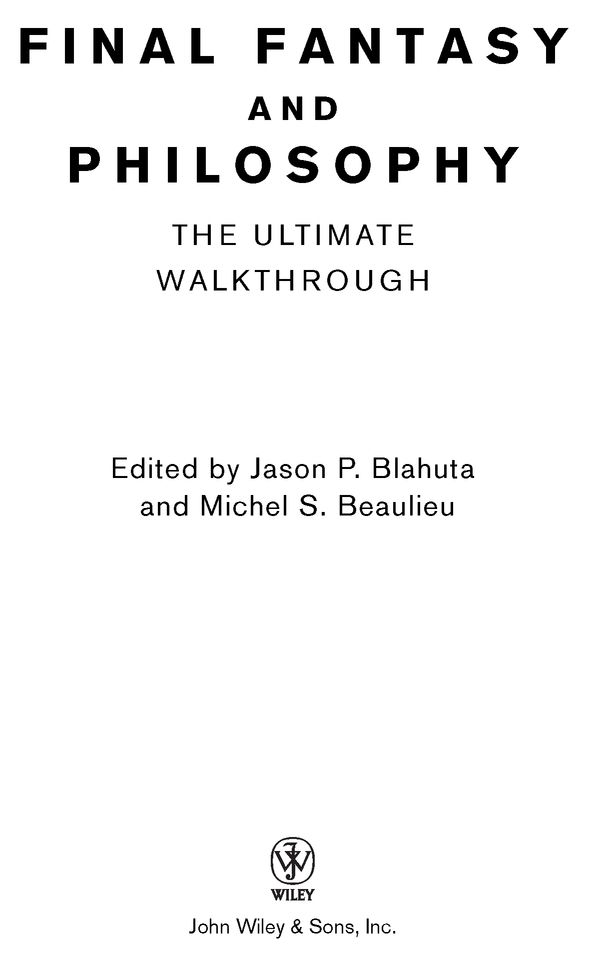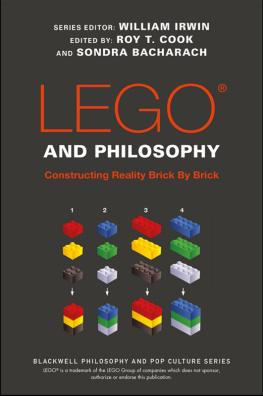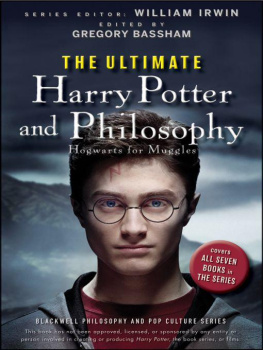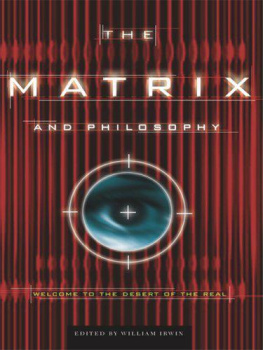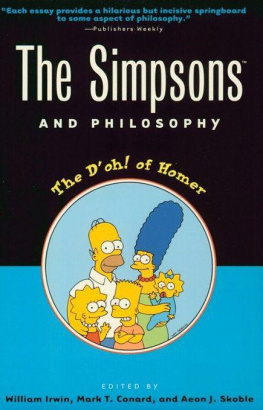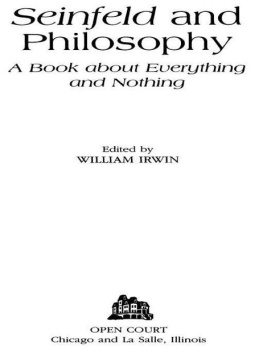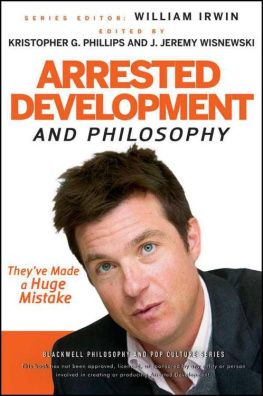Table of Contents
...
...
.
...
The Blackwell Philosophy and Pop Culture Series
Series Editor: William Irwin
South Park and Philosophy
Edited by Robert Arp
Metallica and Philosophy
Edited by William Irwin
Family Guy and Philosophy
Edited by J. Jeremy Wisnewski
The Daily Show and Philosophy
Edited by Jason Holt
Lost and Philosophy
Edited by Sharon Kaye
24 and Philosophy
Edited by Richard Davis, Jennifer
Hart Week, and Ronald Weed
Battlestar Galactica and
Philosophy
Edited by Jason T. Eberl
The Office and Philosophy
Edited by J. Jeremy Wisnewski
Batman and Philosophy
Edited by Mark D. White and
Robert Arp
House and Philosophy
Edited by Henry Jacoby
Watchmen and Philosophy
Edited by Mark D. White
X-Men and Philosophy
Edited by Rebecca Housel and
J. Jeremy Wisnewski
Terminator and Philosophy
Edited by Richard Brown and
Kevin Decker
Heroes and Philosophy
Edited by David Kyle Johnson
Twilight and Philosophy
Edited by Rebecca Housel and
J. Jeremy Wisnewski
GETTING STARTED
The Alternative Instruction Booklet
Unbeknownst to you, the moment you first played Final Fantasy a You Must Read Final Fantasy and Philosophy spell was cast on you (we went back in time and bribed the programmers to put the spell into the first Final Fantasy some twenty years agoand we hope you appreciate how hard it is to program a spell that will work in only 8-bit graphics!).
The You Must Read spell is a status-changing spell spliced together from Sleep, Confuse, and Fire. Sleep, because after staying up all night playing Final Fantasy and reading this bookwhich is really necessary if you want to enjoy the full intellectual richness of the Final Fantasy universeyou will need to sleep all day.
Confuse, because after youve read this book, you will never look at Final Fantasy the same way again. Questions like Does Cloud really exist (or should we really care)? Are our Heroes really heroes? Should we fear our own stopping? and How should we think of and treat the nonhuman world? will no longer be passing thoughts but all-consuming desires that compel you to quest after your own final philosophy.
And Fire, because this book will enflame your soul with a greater desire for Final Fantasy and all things philosophical.
Everything you need to achieve a greater understanding of Final Fantasy and transform your status is here: the Basic Controls, Playing the Game, Abilities, Side Quests, and Other Ways to Enjoy the Game. Mages, Moogles, Fiends, and Kefka, however, have been mashed together with the likes of Machiavelli, Marx, Foucault, and Kafka. The result, we hope, will launch you into your own philosophical quests of Final Fantasy and beyond. And, of course, your intellectual status will be forever changed on reading this book.
Your Party Menu consists of people like you, longtime fans who have spent years exploring the many worlds of Final Fantasy. Some of them, like some of you, have put off their education and careers in order to save a Final Fantasy world. Other began as gamers but became so enthralled with the intellectual depths and challenges of Final Fantasy that they pursued degrees in philosophyperhaps the only truly fulfilling human activity beyond playing Final Fantasy and drinkingin order to keep their brains stimulated while waiting for the next Final Fantasy game to be released. Yet all of them still inhabit these worlds as Summoners, Mages, Warriors, and Thieves, dreading the day when it will be literally and figuratively GAME OVER.
PART ONE
BASIC CONTROLS AND UNDERSTANDING YOUR CHARACTERS
THE SPIKY-HAIRED MERCENARY VS. THE FRENCH NARRATIVE THEORIST: FINAL FANTASYVIIAND THE WRITERLY TEXT
Benjamin Chandler
Cmon, Newcomer. Follow Me: Interpreting Signs in the World of Gaia
Sephiroth hangs in the air before the imprisoned Holy. The time has come to save the world. The heroes are gathered: Red XIII, the giant talking red cat; Vincent Valentine, the demonic, shape-shifting former secret agent; Tifa Lockhart, the martial arts expert; Barret Wallace, the muscle man with the heart of gold, the mouth of a fisherman, and the arm of a, well, gun; Cid Highwind, the chain-smoking pilot; Cait Sith, the remote-controlled, fortune-telling robotic cat; Yuffie Kisaragi, the ninja; and you, the spiky-haired badass mercenary with a monstrous sword. But who will fight the final battle? The choice is yours.
Multiple playable characters allow players more avenues into a text. Roland Barthes (1915-1980) would call Squaresofts Final Fantasy VII (1997) a writerly text because players take an active role in producing the games narrative through their personal gaming experiences. Barthes was interested in semiology, the study of signssignifiers (things that signify) and signifieds (what they signify)and he believed that writers should fill their texts with signifiers, allowing the readers, or consumers, to interpret these for themselves and so produce the text. Characters, objects, and places contain bundles of signifiers. The more playable characters a game has, the more ways a player has to interpret those signifiers, and the more texts the player can produce from it. This process depends on the level to which a player identifies with those characters.
Final Fantasy VII (FFVII) has nine playable characters, not including the brief flashback where Sephiroth is semiplayable, each with his or her own unique bundle of signifiers. They each provide a separate point of entry into the world of FFVII through the interpretation of their individual signifiers. These multiple entry points are one of the indicators of a writerly text. Aside from these entry points, the FFVII franchise comprises multiple texts that combine to form the overall narrative: Final Fantasy VII (1997, RPG); Advent Children (2005, CGI movie); Dirge of Cerberus (2006, action/shooter); and Crisis Core (2008, action/RPG). There is also a collection of novels, a short anime (Last Order, 2005), a mobile phone game (Before Crisis, 2004), and numerous collectibles, including costumes, figurines, and an energy drink. These provide the consumer with even more avenues for entering the FFVII universe, and they multiply the number of signifiers within the series.
The characters in FFVII possess two different types of signifiers. The first type is built into the characters by the game developers, so we might call them presets; they are the fixed aspects of the characters: hair color, speech, age, and so on. Cloud Strife is a spiky-haired badass, Aeris is an ill-fated Cetra, and so on. These presets allow for only a limited set of signifiers, but the characters in FFVII contain psychological depth and therefore a significant number of presets.
The other types of signifiers contained within the FFVII characters are those that can be manipulated by the players. These we might call customizations, in that they are aspects of the characters that can be changed. Tifa might be a martial artist, but that doesnt mean players cant decide to make her a healer as well. Similarly, Red XIII can be a combination Magic-User and Summoner, whereas players might never use Cait Sith for anything at all. These variable customizations not only further increase the number of signifiers a character contains, they also allow players to alter those signifiers to suit their purposes. As Barthes would say, the game is a writerly text: players (consumers) can produce the text of the game for themselves, based on how they choose to interpret the signifiers they assign to each character.

